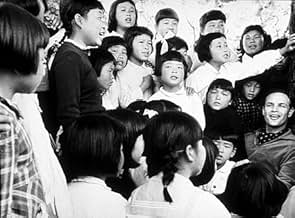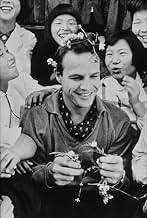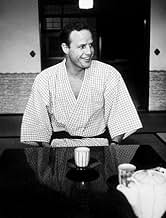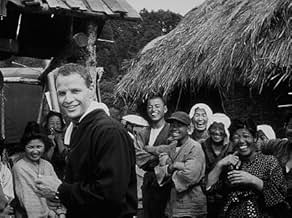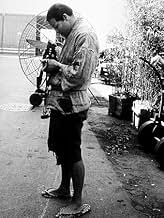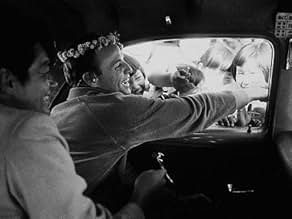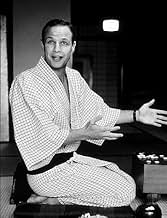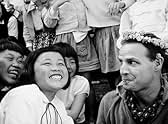La casa de té de la luna de agosto
Título original: The Teahouse of the August Moon
PUNTUACIÓN EN IMDb
6,6/10
3,9 mil
TU PUNTUACIÓN
En el Japón posterior a la Segunda Guerra Mundial, un capitán estadounidense llega para ayudar a construir una escuela, pero los lugareños quieren una casa de té en su lugar.En el Japón posterior a la Segunda Guerra Mundial, un capitán estadounidense llega para ayudar a construir una escuela, pero los lugareños quieren una casa de té en su lugar.En el Japón posterior a la Segunda Guerra Mundial, un capitán estadounidense llega para ayudar a construir una escuela, pero los lugareños quieren una casa de té en su lugar.
- Premios
- 1 premio y 9 nominaciones en total
Machiko Kyô
- Lotus Blossom
- (as Machiko Kyo)
Harry Morgan
- Sgt. Gregovich
- (as Henry {Harry} Morgan)
Carlo Fiore
- Soldier
- (sin acreditar)
John Grayson
- Soldier
- (sin acreditar)
Harry Harvey Jr.
- Soldier
- (sin acreditar)
Miyoshi Jingu
- Old Woman on Jeep
- (sin acreditar)
Roger McGee
- Soldier
- (sin acreditar)
Dansho Miyazaki
- Sumata's Father
- (sin acreditar)
Minoru Nishida
- Mr. Sumata
- (sin acreditar)
Aya Oyama
- Daughter on Jeep
- (sin acreditar)
Argumento
¿Sabías que...?
- CuriosidadesProduction began with Louis Calhern playing Col. Purdy, but Calhern died after more than a month of filming. Paul Ford was quickly recruited, as he had created the role on Broadway, and this resulted a revived career for the lovable, irascible character actor.
- PifiasWhile Fisby and Sakini are finishing up their first address to the villagers Sakini asks Fisby what time it is. He responds that it's a quarter to 5:00. But the sun is directly over their heads as if it were noon.
- ConexionesFeatured in Okinawa: Keystone of the Pacific (1973)
- Banda sonoraSakura Sakura (Cherry Blossoms)
(uncredited)
Written and Arranged by Kikuko Kanai
Sung by Lotus Blossom
Reseña destacada
This film made me realize how much we've lost as a country since the 1950s. According to Wikipedia at least, the book, play, and film were enormously popular for about 25 years, when political correctness set in, and liberals were oh-so-terribly aghast at Marlon Brando playing an Okinawan with a heavy accent. But it's Brando's character who is the most admirable in the movie -- sharp, perceptive, and cunning, but also warm, generous, and forgiving.
All told, it's the Okinawans who come off well -- it is we Americans who seem rather ridiculous, with our notions of winning hearts and minds and spreading democracy. Remember that this film was made just ten years after WWII, when we were up against the Soviet Union, and democracy and "the American way" were at the heart of what we thought we were all about. But here is a film that completely satirizes, if not ridicules, all that, and yet it was enormously popular.
Perhaps I'm looking at it through rose-tinted lenses -- there may well have been the Michael Savages and Rush Limbaughs of the day who inveighed against the Hollywood liberals seeking to undermine American resolve in the face of the Soviet threat and disgracing the memory of those who had died in WWII.
But I think, more accurately, it was a time of greater American self- confidence, when we were able to laugh at ourselves more easily, and weren't terrified that this, that or another group might be ticked off.
In short, this is a wise movie that should be seen by all those in power who have anything to do with how we conduct ourselves toward other nations and peoples -- as well as anyone who wants to see an entertaining but also educational film.
All told, it's the Okinawans who come off well -- it is we Americans who seem rather ridiculous, with our notions of winning hearts and minds and spreading democracy. Remember that this film was made just ten years after WWII, when we were up against the Soviet Union, and democracy and "the American way" were at the heart of what we thought we were all about. But here is a film that completely satirizes, if not ridicules, all that, and yet it was enormously popular.
Perhaps I'm looking at it through rose-tinted lenses -- there may well have been the Michael Savages and Rush Limbaughs of the day who inveighed against the Hollywood liberals seeking to undermine American resolve in the face of the Soviet threat and disgracing the memory of those who had died in WWII.
But I think, more accurately, it was a time of greater American self- confidence, when we were able to laugh at ourselves more easily, and weren't terrified that this, that or another group might be ticked off.
In short, this is a wise movie that should be seen by all those in power who have anything to do with how we conduct ourselves toward other nations and peoples -- as well as anyone who wants to see an entertaining but also educational film.
- elision10
- 17 mar 2014
- Enlace permanente
Selecciones populares
Inicia sesión para calificar y añadir a tu lista para recibir recomendaciones personalizadas
Detalles
- Fecha de lanzamiento
- País de origen
- Idiomas
- Títulos en diferentes países
- The Teahouse of the August Moon
- Localizaciones del rodaje
- Empresa productora
- Ver más compañías en los créditos en IMDbPro
Taquilla
- Presupuesto
- 3.926.000 US$ (estimación)
- Duración2 horas 3 minutos
- Mezcla de sonido
Contribuir a esta página
Sugerir un cambio o añadir el contenido que falta

Principal laguna de datos
By what name was La casa de té de la luna de agosto (1956) officially released in India in English?
Responde

